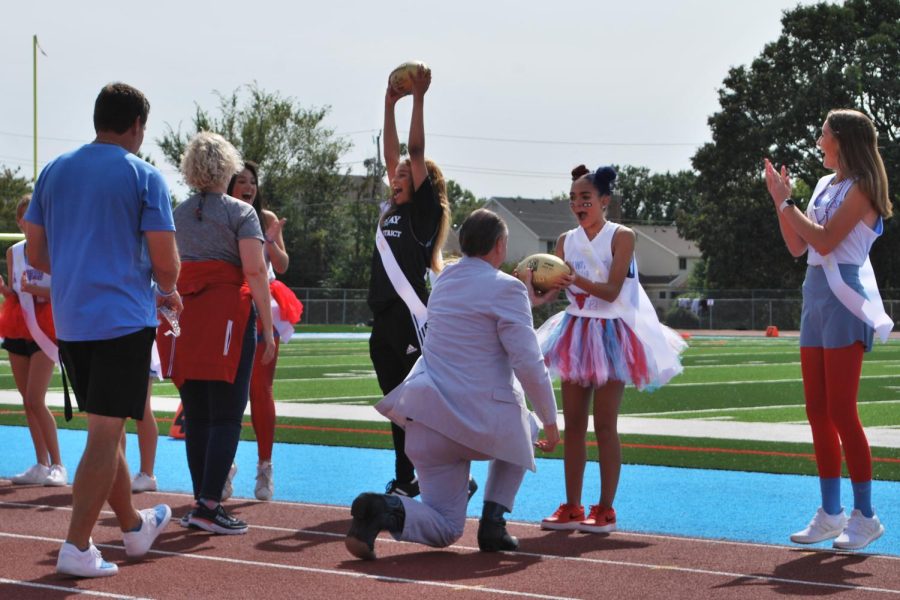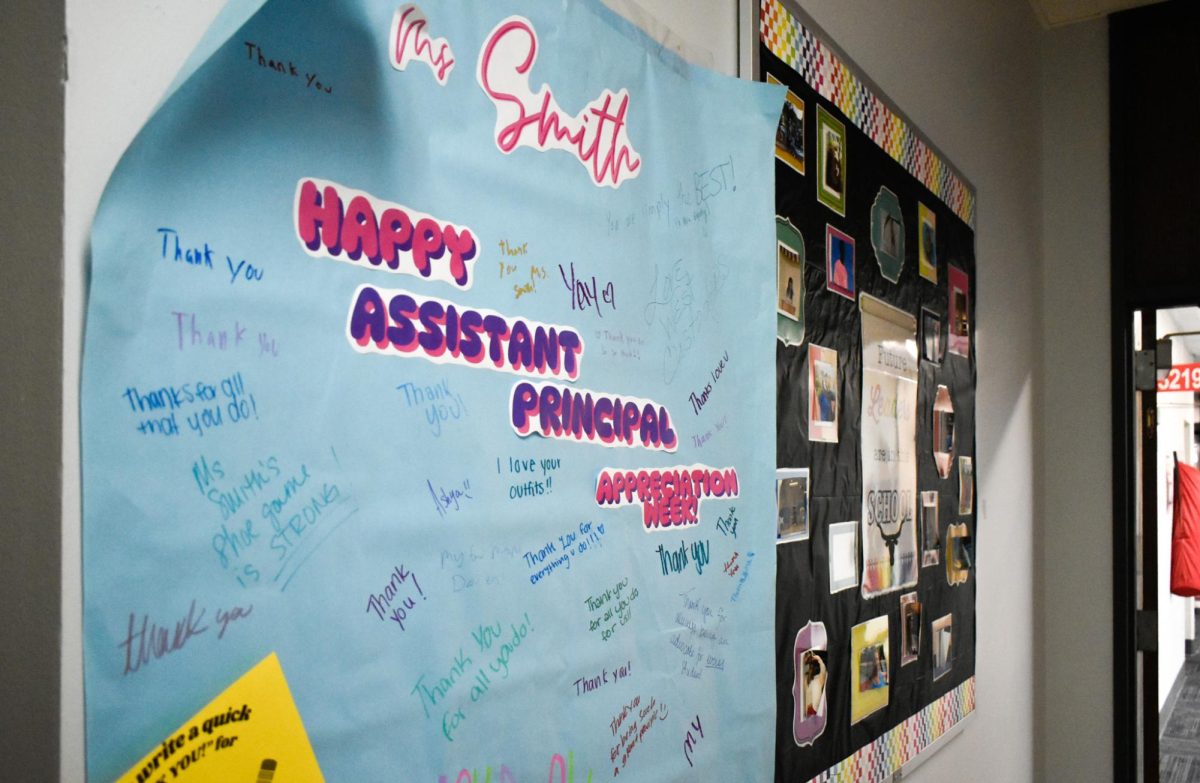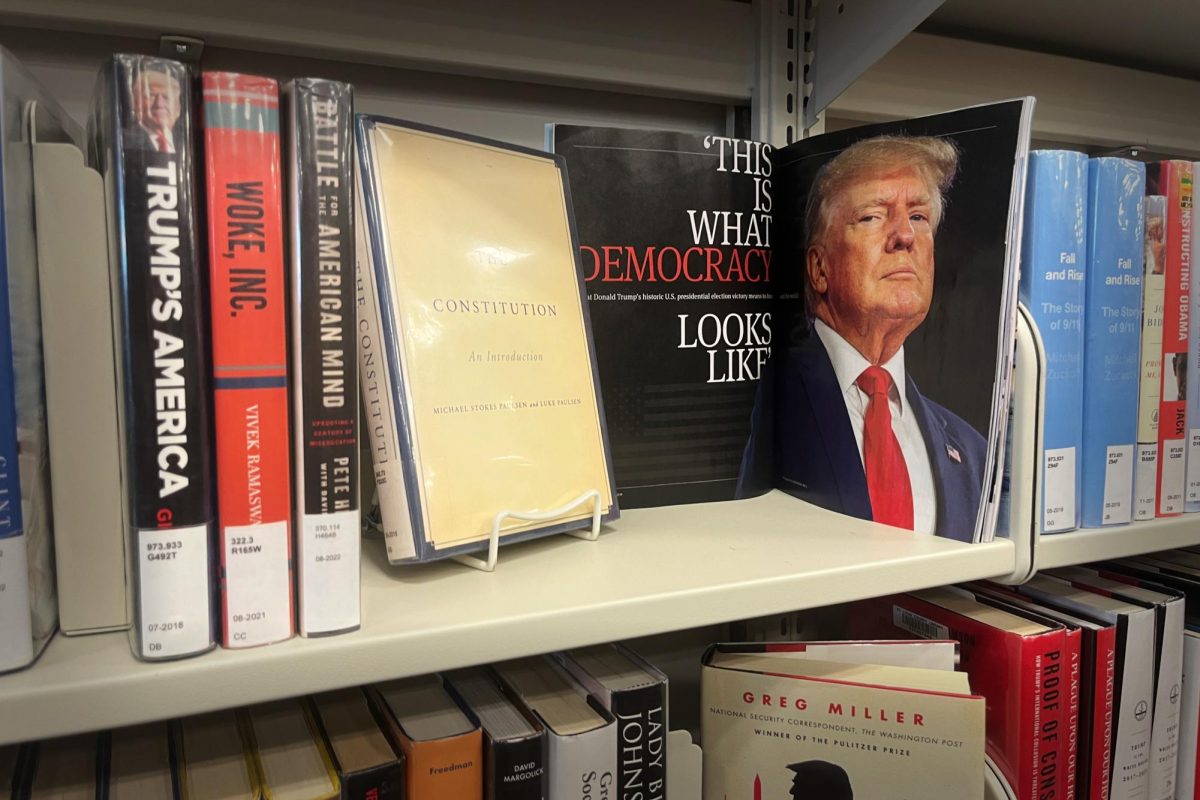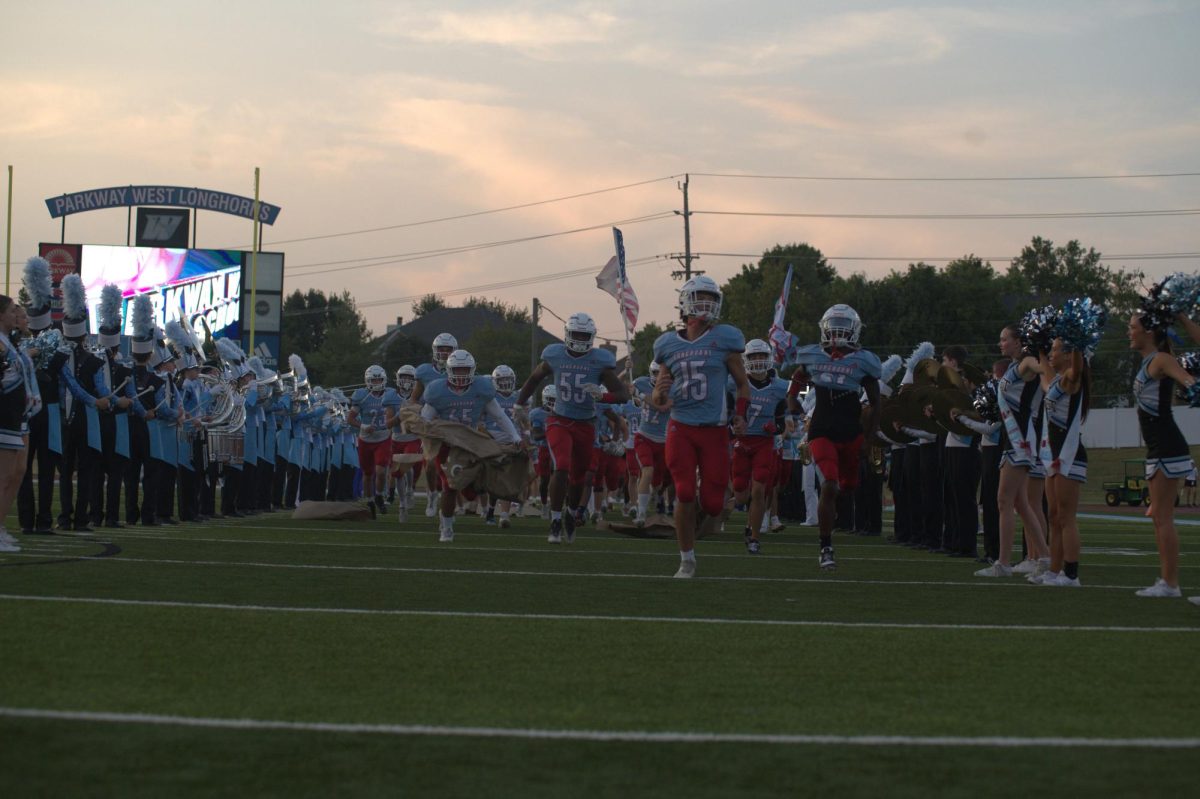It’s that time of year again. Floats covered in streamers roll down streets, students dress up for their themes and the school transforms into another world as classes decorate their individual areas. But for many, there’s one aspect of Homecoming season that is a lot less glamorous: the egregious reminder of the school’s deeply ingrained gender binary.
This year, despite talks of phasing Spirit King and Queen into Spirit Royalty, the titles remained the same. We no longer have male escorts, who were typically chosen by staff while the girls had to go through a popularity contest. This year, only girls were included on the court, going through the same process as always. Don’t get us wrong, we’re not saying these fun traditions should be eradicated, but we must acknowledge that the way they’re enacted excludes a lot of people who don’t fit within the gender binary.
In attempts to rectify this exclusion, many high schools and colleges that have attempted to make such traditions more welcoming to all face backlash. Articles refer to nasty Facebook comments calling these actions ‘lefitst’ and ‘radical,’ asking why fun traditions have to be altered for genderqueer people. ‘Can’t they just deal with it?’
No, they can’t. They shouldn’t have to. The point of altering homecoming king or queen titles is to be more inclusive, not less.
At Evanston Township High School in Evanston, Ill., two students of any gender from the homecoming court are chosen as “Homecoming Royalty.” At Purdue University in West Lafayette, Ind., homecoming court is made of 10 students regardless of gender, and similarly to Evanston Township, any two can be selected to be “Homecoming Royalty.” At Northwestern University in Evanston, Ill., homecoming queen and king were switched to one “Homecoming Wildcat,” the school’s mascot, who can choose between a queen, king or gender neutral crown.
“‘We are honoring our homecoming tradition while updating it to be more inclusive and representative of our diverse student body,’” Northwestern University homecoming committee member Yari Gallegos said. “‘These changes at universities across the country represent the growing diversity of their respective student bodies and the move towards creating more inclusive spaces.’”
Updating homecoming traditions will not take away from the broader community; it only serves to enhance the experience for people the current culture excludes. This one small thing can be a key step in expanding how we interact as a community, especially with our nonbinary peers.
Freshman Ash Herring has known their identity since they were young, and wants to see more of a change in the way we represent traditions and inclusiveness.
“[Identifying] can be a very personal thing. If you do [have] to say ‘I identify as what I was assigned as at birth,’ when you personally know it’s not true, it can be hard to say that to yourself,” Herring said. “Some people don’t get comfort at home and that can be hard and it can really hurt your development as a person… school should be a place [where] everyone can be comfortable.”
We are in a world already unaccomodating to nonbinary or genderqueer individuals, a world where just going to use the restroom can cause needless stress and anxiety. All members of our community deserve recognition, deserve to feel seen and valued. Homecoming court is one place where we can really make a difference, allowing students of any gender to be represented.
“While the school does do a fairly good job with gay, lesbian and bisexual support, we could work a little harder for the trans and nonbinary community,” Herring said. “Identifying as trans or nonbinary is affiliatied with loving yourself, because it’s just loving yourself for who you are.”
We need to show the trans, nonbinary and genderqueer community more love. We need to make sure the traditions we uphold include all members of our community. These changes should not be accompanied by guilt trips and backlash from cispeople who don’t see the point. It does not take away from anyone’s experience, but it can mean the world to someone else.
Updating homecoming traditions is just one step. We have another 12 months until the next homecoming week; are we going to sit passively and allow this non inclusive environment to perpetuate? Or are we going to take active steps? Instead of asking what we have to do, we should be asking what we can do.



![Dressed up as the varsity girls’ tennis coach Katelyn Arenos, senior Kate Johnson and junior Mireya David hand out candy at West High’s annual trunk or treat event. This year, the trunk or treat was moved inside as a result of adverse weather. “As a senior, I care less about Halloween now. Teachers will bring their kids and families [to West’s Trunk or Treat], but there were fewer [this year] because they just thought it was canceled [due to the] rain. [With] Halloween, I think you care less the older you get,” Johnson said.](https://pwestpathfinder.com/wp-content/uploads/2025/10/DSC00892-1-1200x800.jpg)
![Leaning on the podium, superintendent Melissa Schneider speaks to Parkway journalism students during a press conference. Schneider joined Parkway in July after working in the Thompson School District in Colorado. “My plan [to bond with students] is to get things on my calendar as much as possible. For example, being in [classes] is very special to me. I am trying to be opportunistic [meeting] kids [and] being in [the school] buildings. I have all the sports schedules and the fine arts schedules on my calendar, so that when I'm available, I can get to them,” Schneider said.](https://pwestpathfinder.com/wp-content/uploads/2025/09/IMG_5425-1200x943.jpeg)


![Red, white and blue, the American flag holds the values of our democracy. The fight that we once endured has returned, as student journalists and senior correspondents across the country are losing their voices due to government control. “[Are] the White House and [the] government limiting free speech [and] freedom of the press? Yes [they are],” chief communications officer of the Parkway School District and former journalist Elisa Tomich said.](https://pwestpathfinder.com/wp-content/uploads/2025/03/Untitled-design-14.jpg)
![A board in the Parkway West counseling department displays pennants of selective universities. With a wide range of students interested in attending, it’s important that these schools have clear priorities when deciding who to admit. “[Washington University] had the major that I wanted, psychology, philosophy, neuroscience. That's a holistic study of the brain, and [WashU is] the only college in the world that offers that. That's the main reason I wanted to go; I got into that program,” senior Dima Layth said.](https://pwestpathfinder.com/wp-content/uploads/2025/02/Flag-1.png)

![Within the U.S., the busiest shopping period of the year is Cyber Week, the time from Thanksgiving through Black Friday and Cyber Monday. This year, shoppers spent $13.3 billion on Cyber Monday, which is a 7.3% year-over-year increase from 2023. “When I was younger, I would always be out with my mom getting Christmas gifts or just shopping in general. Now, as she has gotten older, I've noticed [that almost] every day, I'll open the front door and there's three packages that my mom has ordered. Part of that is she just doesn't always have the time to go to a store for 30 minutes to an hour, but the other part is when she gets bored, she has easy access to [shopping],” junior Grace Garetson said.](https://pwestpathfinder.com/wp-content/uploads/2024/12/DSC_0249.JPG-1200x801.jpg)

![Senior Sally Peters stands in the history hallway, contemplating her choices in the 2024 United States and Missouri elections on Nov. 5. As a member of Diplomacy Club, Peters has discussed key candidates and issues in contemporary American politics. “[As students], we're starting to become adults. We're realizing how much the policies that are enforced and the laws that make it through the House and Senate are starting to affect us. [Opportunities such as] AP [U.S.Government] and Diplomacy Club [make elections feel] a lot more real,” Diplomacy Club vice president and senior Nidhisha Pejathaya said.](https://pwestpathfinder.com/wp-content/uploads/2024/10/Flag-1-1.png)
![Sitting courtside before a junior varsity girls’ tennis match, senior Tanisi Saha rushes to finish her homework. Saha has found herself doing academic work during her athletic activities since her freshman year. “Being in sports has taught me how to stay organized and on top of my schoolwork. [With] a busy practice and game schedule, I’ve learned to manage my homework and study time better,” Saha said.](https://pwestpathfinder.com/wp-content/uploads/2025/11/DSC_0022-1200x800.jpg)
![Sophomore Maryem Hidic signs up for an academic lab through Infinite Campus, a grading and scheduling software. Some students enjoyed selecting their responsive schedule in a method that was used school-wide last year. “I think it's more inconvenient now, because I can't change [my classes] the day of, if I have a big test coming and I forget about it, I can't change [my class],” sophomore Alisha Singh said.](https://pwestpathfinder.com/wp-content/uploads/2025/10/DSC_0012-1200x801.jpg)
![Senior Dhiya Prasanna examines a bottle of Tylenol. Prasanna has observed data in science labs and in real life. “[I] advise the public not to just look or search for information that supports your argument, but search for information that doesn't support it,” Prasanna said.](https://pwestpathfinder.com/wp-content/uploads/2025/10/DSC_0073-2-1200x800.jpg)
![Junior Fiona Dye lifts weights in Strength and Conditioning. Now that the Trump administration has instituted policies such as AI deregulation, tariffs and university funding freezes, women may have to work twice as hard to get half as far. "[Trump] wants America to be more divided; he wants to inspire hatred in people,” feminist club member and junior Clara Lazarini said.](https://pwestpathfinder.com/wp-content/uploads/2025/05/Flag.png)
![As the Trump administration cracks down on immigration, it scapegoats many immigrants for the United States’ plights, precipitating a possible genocide. Sophomore Annabella Whiteley moved from the United Kingdom when she was eight. “It’s pretty scary because I’m on a visa. When my visa expires next year, I’m not sure what’s going to happen, especially with [immigration] policies up in the air, so it is a concern for my family,” Whiteley said.](https://pwestpathfinder.com/wp-content/uploads/2025/05/DSC_0077-7copy.jpg)
![Shifting global trade, President Donald Trump’s tariffs are raising concerns about economic stability for the U.S. and other countries alike. “[The tariffs are] going to pose a distinct challenge to the U.S. economy and a challenge to the global economy on the whole because it's going to greatly upset who trades with who and where resources and products are going to come from,” social studies teacher Melvin Trotier said.](https://pwestpathfinder.com/wp-content/uploads/2025/05/MDB_3456-1200x800.jpg)



![Some of the most deadly instances of gun violence have occurred in schools, communities and other ‘safe spaces’ for students. These uncontrolled settings give way to the need for gun regulation, including background and mental health checks. “Gun control comes about with more laws, but there are a lot of guns out there that people could obtain illegally. What is a solution that would get the illegal guns off the street? We have yet to find [one],” social studies teacher Nancy Sachtlaben said.](https://pwestpathfinder.com/wp-content/uploads/2025/01/DSC_5122-1200x800.jpg)

![Sophomore Shree Sikkal Kumar serves the ball across the court in a match against Lindbergh. Sikkal Kumar has been a varsity member of the varsity girls’ tennis team for two years, helping her earn the number two rank in Class 2 District 2.“When matches are close, it’s easy to get nervous, but I [ground] myself by[staying] confident and ready to play,” Sikkal Kumar said.](https://pwestpathfinder.com/wp-content/uploads/2025/11/DSC2801-1200x798.jpg)
![Focused on providing exceptional service, sophomore Darsh Mahapatra carefully cleans the door of a customer’s car. Mahapatra has always believed his customers deserve nothing less than the best. “[If] they’re trusting us with their car and our service, then I am convinced that they deserve our 100 percent effort and beyond,” Mahapatra said.](https://pwestpathfinder.com/wp-content/uploads/2025/10/DSC_0018-1200x800.jpg)
![Sophomore Aleix Pi de Cabanyes Navarro (left) finishes up a soccer game while junior Ava Muench (right) warms up for cross country practice. The two came to Parkway West High School as exchange students for the 2025-2026 school year. “The goal for the [exchange] program is to provide opportunities for both Parkway students and our international exchange students to learn about other cultures, build connections and become confident, capable, curious and caring — Parkway’s Four C’s — in the process,” Exchange Program Lead Lauren Farrelly said.](https://pwestpathfinder.com/wp-content/uploads/2025/10/Feature-Photo-1200x800.png)
![Gazing across the stage, sophomore Alexis Monteleone performs in the school theater. The Monteleone family’s band “Monte and the Machine” has been releasing music since 2012, but Alexis started her own solo career in 2024 with the release of her first single, Crying Skies. “My whole family is very musical, [and I especially] love writing [songs with them],” Monteleone said.](https://pwestpathfinder.com/wp-content/uploads/2025/09/DSC7463-1200x798.jpg)

![Leaping through the air, senior Tyler Watts celebrates his first goal of the season, which put the Longhorns up 1-0 against the Lafayette Lancers. Watts decided to play soccer for West for his last year of high school and secured a spot on the varsity roster. “[Playing soccer for West] is something I had always dreamed of, but hadn’t really had a good opportunity to do until now. It’s [really] fun being out [on the field], and I’m glad I decided to join the team. It’s just all about having fun with the boys and enjoying what time we have left together,” Watts said.](https://pwestpathfinder.com/wp-content/uploads/2025/09/DSC_1951-1200x855.jpg)

![Pitching the ball on Apr. 14, senior Henry Wild and his team play against Belleville East. Wild was named scholar athlete of the year by St. Louis Post-Dispatch after maintaining a high cumulative GPA and staying involved with athletics for all of high school. “It’s an amazing honor. I feel very blessed to have the opportunity to represent my school [and] what [it] stands for,” Wild said.](https://pwestpathfinder.com/wp-content/uploads/2025/05/unnamed-6-1200x714.jpg)
![Freezing in their position, the Addams Family cast hits the “rigor mortis” pose after cast member and senior Jack Mullen, in character as Gomez Addams, calls out the stiff death move. For the past four months, the combined company of cast members, orchestra pit, crew and directors all worked to create the familial chemistry of the show. “I’m excited for [the audience] to see the numbers, the music, the scenes, but I also just love all the technical aspects of it. The whole spectacle, the costumes, makeup and the people that put in the work backstage in order to make the show successful on stage. I’m excited for people to see and appreciate that,” Mullen said.](https://pwestpathfinder.com/wp-content/uploads/2025/03/DSC0116-1200x800.jpg)
Susan Santhuff • Oct 3, 2021 at 9:36 am
Great article!! Great points, don’t stop fighting for what you want and need from school. I’m so glad that Pathfinder allows freedom to say what you want to say, it’s been a real breath of fresh air over the years my kids were at West.
Mollie Gulino • Oct 2, 2021 at 11:40 am
It is so important that we continue to progress and adapt to promote inclusivity. Every kid deserves to be seen, accepted, and loved just as they are and that cannot truly happen until school policies and traditions reflect that inclusion. Great article and wise insight from both the editorial board and Ash.
Julie Northrip • Oct 2, 2021 at 11:32 am
I never had a desire to participate in homecoming activities as a student at West, decades ago, as I felt it was something just for the “in crowd,” as we called it. We didn’t at that time even think about gender identity. Homecoming court was about who was popular and to be popular meant being part of a very small, exclusive group of people.
Opening up homecoming to everyone, and removing titles, to be more inclusive, is way overdue. I’m proud of the students today for speaking up.
Candice Gillespie • Oct 2, 2021 at 11:25 am
Thank you for the wonderful article!! Here’s to embracing the future and the brave and strong young people doing the work to make this world a better place.